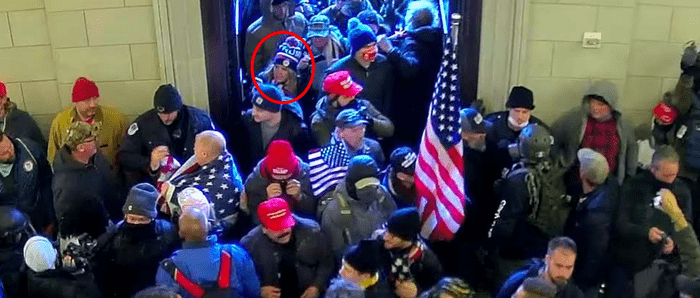I watched the bizarre assault live on television as I rocked an infant in my arms. I have spent every waking minute reading eyewitness accounts, listening to podcasts and watching cable news. I’m trying to understand. I’m asking myself if American democracy and evangelical Christianity can survive this horror.

Alan Bean
The first really helpful insight I encountered came at the very beginning of a podcast conversation between Chris Hayes and Ta-Nehisi Coates. If you really believe the election was stolen, Coates said, then storming the Capitol might be appropriate behavior.
For those of a particular persuasion, Coates observed, the “stolen election” is simply the consummation of a string of outrages. For eight years, they endured a president who was “some kind of Muslim-Kenyan Sleeper,” a man unqualified for the presidency because he wasn’t one of us. He wasn’t a true American. Then a woman who is “somehow involved in a cult that exulted in child pornography” served as Secretary of State and “came within a hair’s-breadth of inhabiting the White House.”
After almost stealing the 2016 election, the media and “the deep state” spent four years humiliating a great and noble man, then stole the presidency. All of these beliefs, Coates said, have been majority positions within the Republican Party.
“We can no longer pretend that the truth doesn’t matter.”
We can no longer pretend that the truth doesn’t matter. Either we suffered under an imposter president for eight years, or we did not. Either Hillary and Bill Clinton lead an international cabal of pedophiles, or they do not. Either the 2020 election was stolen, or it was not. The people who stormed the Capitol are either patriots, or they are deluded seditionists.
According to recent polls, between 70% and 80% of Republicans are convinced that Trump won the election. It is hardly surprising, therefore, that 45% of these voters approve of the siege on Jan. 6.
The evidence is scant at this point, but it appears that most of the folks storming the Capitol, and most of those who are down with insurrection, identify as Christians of a particular type.

James McGrath
In a post-siege blog post, James McGrath observed, with sorrow, that many of his old mates from Sunday school are now knee-deep in conspiracy theories like QAnon. At first, McGrath wondered how these people, who seemed perfectly normal back in the day, could have changed so much. Or had they learned their religious lessons all too well?
“Whether the subject is biblical inerrancy, the end times, Satanism, antievolutionism or anything else,” McGrath says, “people are enculturated … in such a way in conservative Christian circles that all the supporting ‘evidence’ can be shown to be false, and yet the structure built on that foundation doesn’t fall.”
McGrath’s post made a big impression on Fred Clark, a gifted blogger who attended a Christian high school in the 1980s. Clark (known to his faithful readers as “the Slacktivist”) remembers that Hal Lindsey’s pop-apocalyptic writings were assigned as school textbooks. In that world, Lindsey’s belief that the world was sure to end by 1990 was taken as a core belief, not to be questioned.
At the same time, Clark’s teachers stressed the importance of getting good grades so you could get into a good college, land a high-paying job and support your Christian family.
“It wasn’t a matter of ‘But just in case the Bible prophecy scholars are wrong and the Lord tarries, then you’ll need a Plan B,’” Clark explains. “It was, instead, a constant yet constantly unacknowledged contradiction. And what that contradiction taught us was that the things we believed or claimed to believe didn’t matter — that the substance of our ‘beliefs’ did not need to correspond to reality or to affect the reality of our lives in any meaningful way.”
The folks at the vanguard of the Capitol siege were primarily members of paramilitary groups like the Proud Boys, the Oath Keepers and 3 Percenters. These people were intent on insurrection. Nancy Pelosi and Mike Pence came within seconds of being face-to-face with these men; a confrontation that almost certainly would have ended in bloodshed. Check out Luke Mogelson’s chilling piece in the New Yorker, “Among the Insurrectionists,” if you want to know more about the rightwing militia movement.
But most of the people surrounding the Capitol were dilettantes. They reminded me of the professional wrestlers on Stampede Wrestling when I was a boy. Archie “the Stomper” Goldie would snatch the mic and, in full drill sergeant mode, threaten to burn down the promoter’s house with his family inside. I didn’t take this talk seriously. Not really. But I kind of believed it. Just enough to enjoy the show. Nothing Archie Goldie said meant anything. His only real interest was in self-promotion.
“When Trump realized his response had placed him in legal jeopardy, he read a statement off the teleprompter decrying violence and vandalism.”
Donald Trump has a long affiliation with WWE wrestling, and it shows. His words and actions are designed to enhance his personal brand and are adjusted to suit the situation. His first response to the Capitol riot, according to White House staff, was childish delight. Then he worried that the rioters weren’t showing enough class. Finally, after hours of inaction, he told the rioters they were “special” and announced that the party was over. When Trump realized his response had placed him in legal jeopardy, he read a statement off the teleprompter decrying violence and vandalism.
In short, the ex-president came off with all the gravitas of Jacob Chansley, the “QAnon Shaman,” who waltzed into the Senate chambers covered in tattoos, grotesque body paint, Viking horns and an American flag attached to a spear. Chansley bellowed, he howled, he plopped down in the Speaker’s chair and scrawled a note to Mike Pence: “It’s only a matter of time, justice is coming.” He came to the Capitol to promote his personal brand and made the most of the opportunity.

Texas Realtor Jenna Ryan
Or consider the case of poor Jenna Ryan, a successful Realtor and talk show host from North Dallas. Jenna flew to Washington, D.C., in a private jet rented by a friend. Like most members of the mob marching to the Capitol, she spent most of her time memorializing “one of the best days of my life” for her followers on social media.
“We’re gonna go down and storm the Capitol,” she told her people. “This is a prelude to going to war. We are going to f**king go in here. Life or death, it doesn’t matter. Here we go.”
Arriving at her destination, Jenna paused to take a selfie by a shattered window. “Window at The capital,” she tweeted. “And if the news doesn’t stop lying about us we’re going to come after their studios next.”
Then, apropos of nothing, she blurted, “Y’all know who to hire for your Realtor; Jenna Ryan for your Realtor.”
Once inside the building, with the sound of sirens and breaking glass providing background music, Jenna screamed, “U-S-A! U-S-A!” and “Here we are, in the name of Jesus!”
Jenna was arrested shortly after arriving back in Plano, Texas. The charges against her are misdemeanors but could escalate. Instantly, her message shifted. “Hatred and violence toward each other are not going to solve our country’s issues,” she told the media. “As a nation, we need to come together Republican, Democrat and independent and have an open and honest discussion about the issues in our country and resolve our issues in peace.”
“How do we reconcile Jesus-warrior Jenna with peace-and-love Jenna?”
How do we reconcile Jesus-warrior Jenna with peace-and-love Jenna? We can’t. Like the preachers and politicians she grew up listening to, Jenna is a self-promoting cypher. She believes and says whatever suits her purposes at the moment. And none of it means anything.
And yet, as Jenna the Realtor, Jacob the QAnon shaman and ex-President Trump are about to discover, words and actions have consequences. Life ain’t pro wrestling. It’s painfully real. If Jesus were just another vacuous self-promoter, he would have lived to see his grandchildren. But Jesus spoke hard truth to hard power and lived with the hard consequences.
Jesus was present at the Capitol Jan. 6. He heard the speeches. He saw the pious and profane posturing. Jesus comforted police officers and politicians in their distress. He cradled the dying in his arms. And, once again, Jesus wept.
Alan Bean is executive director of Friends of Justice, an alliance of community members that advocates for criminal justice reform. He lives in Arlington, Texas.
Related articles:
Insurrection postscript: The church’s one foundation isn’t the USA | Bill Leonard
Denominational leaders denounce Capitol violence while evangelicals offer mixed responses
Toxic masculinity, 24-hour news and complacency fed the Jan. 6 riots | John Jay Alvaro
Broken churches, broken nation: Will evangelicals ‘recalculate’ or rebel? | Bill Leonard
It’s past time to admit the hard truths behind the Capitol riots | Wendell Griffen
Christian symbols and sedition at the Capitol: The church has work to do | Rhonda Abbott Blevins

